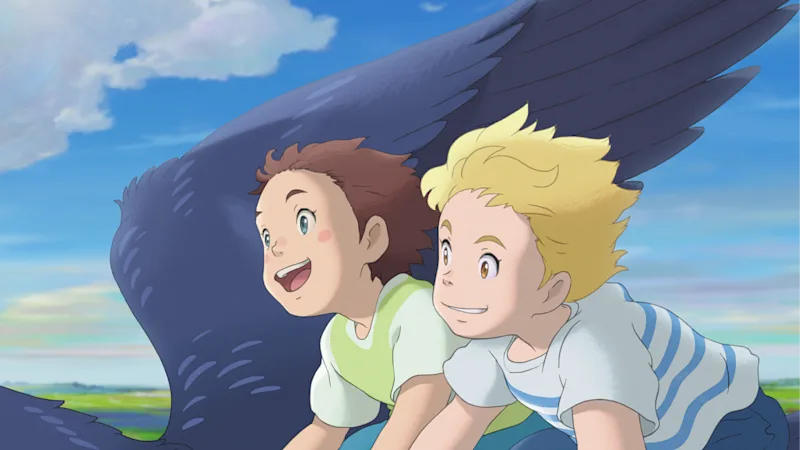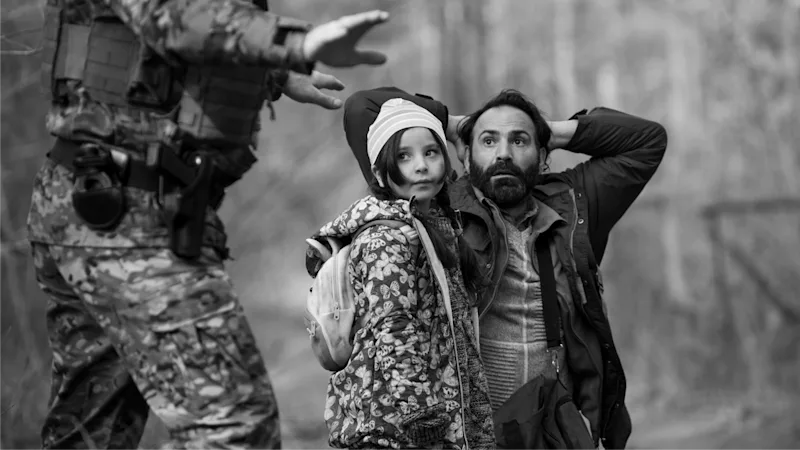Pedro Almodóvar did not make Strange Way of Life because he didn't direct Brokeback Mountain.
It is true that the Oscar-winning Spanish auteur was approached to direct the adaptation of Annie Proulx's short story, and that he ultimately turned it down because, as he's said, he "never believed that they would give me complete freedom and independence to make what I wanted." (Instead, Ang Lee helmed 2005's Brokeback Mountain, for which he won the Best Director.) Now, nearly two decades later, Almodóvar has made a queer Western of his own, but the filmmaker says, "I wasn't actually thinking about Brokeback Mountain when I started writing this."
"Very often, I start writing for the pure pleasure of writing," he explains via a translator. "I already had this story about two men who, after a night of sex, find themselves reacting very differently to the events of the previous night. And then sometimes I bring these stories into movies that I'm going to shoot, and sometimes I don't. I have a lot of stories that I just write for the pleasure of it."
"But it's true that there is a moment when I was thinking about Brokeback Mountain," Almodóvar himself chimes in. As he explains, Strange Way of Life is his answer to Brokeback Mountain in so far as it literally answers a question posed in that film. "In Brokeback Mountain, there is a sequence where Jake Gyllenhaal asks Heath Ledger's character why they don't rent a ranch and start living together and all that. And Heath Ledger said, 'What can two men do on a ranch together?' As if it was a really absurd thing he was asking. In the multiverse of universes, 18 years after, Pedro Pascal answers that question. In my movie, there is an answer."

Strange Way of Life began as 10 or so pages of dialogue between a sheriff and a cowboy, who once embarked on a steamy affair while working as hired gunslingers. Reunited 25 years later, the centerpiece scene takes place after the two men have consummated their relationship once again, and spend the next morning arguing over their true feelings, their ulterior motives, what they are to one another — and what they could be. "For reasons that I don't know, when I first wrote this big dialogue between these two men, I really wanted to shoot it," the filmmaker says. "But I didn't think what to do with it."
A chance call from Anthony Vaccarello, the creative director of the fashion label Saint Laurent, provided the answer: Having previously produced a short film for Gaspar Noé, Vaccarello wanted to collaborate with Almodóvar. So, the filmmaker kept writing, expanding those initial pages into a Western melodrama complete with the genre's compulsory shootout. Even as Almodóvar was writing, he knew Strange Way of Life would not be a feature; he wanted to keep the short film "very abstract" and focus only on these two men in this one moment.
The filmmaker had no interest in making a historically-accurate period piece ("Vaccarello showed me the real underwear of the beginning of the 20th century, and I found it awful!"), nor did he have a desire to make a spaghetti Western, despite shooting on the same Spanish sets constructed for Sergio Leone's Man with No Name Trilogy starring Clint Eastwood. He wanted to make a proper American Western in the vein of Howard Hawks' El Dorado or Robert Aldrich's Vera Cruz. "In my mind, these two characters are from a Sam Peckinpah movie. Like, they escaped from The Wild Bunch," he says, or like cowboys from a queered version of John Sturges' Technicolor Western, Last Train from Gun Hill. "Just think, Anthony Quinn goes to visit Kirk Douglas, now imagine if they were gay."
"I think that naked words are much more powerful than naked bodies."
Almodóvar cast his actor friends Ethan Hawke and Pedro Pascal as the stoic Sheriff Jake and the lovelorn Silva, respectively. "The chemistry between actors is something that happens or it doesn't," he muses, "and it's always a mystery." With Hawke and Pascal, it happened. That said, Almodóvar is uncharacteristically discreet when it comes to their orgiastic encounter together; as soon as the two men kiss, the film fades to black. This was, the filmmaker says, by design.
"Because the important thing is not only that they make love and they drank a lot of alcohol, and they remember when they were younger. I mean, they absolutely wanted to f**k," Almodóvar says with a wicked grin. "Since the beginning, they know what is going to happen, in the way Silva looks at Jake, in the way they talk, when he says, 'You know, that when I'm drunk, I always think about that moment.' They know that the other has a second intention, but they postpone it to the following day, because no one of them want to miss that night full of alcohol and sex!"
But even more erotic than what they do with one another, is what they say to each other. "These two men talking about desire is really... I don't want to say unique, but I'm not used to hearing mature guys talking about that after having a night of sex! I mean, Pedro says to Ethan, 'You cure all my ailments.' From the beginning, I wanted to give the power to the word, because I think that naked words are much more powerful than naked bodies."

Strange Way of Life had its premiere at this year's Cannes Film Festival, where the short film was the talk of the Croisette. Almodóvar subsequently found himself fielding one query in particular: Would he consider turning 'Strange Way of Life' into a feature film? He wants to be clear. "It ends in a peaceful moment, but it gives the impression that this couple is going to live together," he chuckles. "That was not my intention!"
After releasing two short films — before Strange Way of Life, Almodóvar directed 2020's Tilda Swinton-starring The Human Voice — his next film will be his first English-language feature, although Almodóvar is being more coy than usual about the specifics of the project. (It will center on three women living in New York City, but that is all we know.) More than four decades into his filmmaking career, the auteur is less concerned with chasing newness for newness' sake — a new genre, a new format, a new language — than continuing to follow his passion. "In fact, my passion for a project is the single reason I either decide to make the project or not make the project."
"What is important is just to feel this excitement, and this is what I hope when I'm thinking about my future," Almodóvar considers. "Sometimes I'm afraid of losing not the talent or the capacity, but losing this strong addiction that I feel to keep on making movies. Because in my case, to make a movie is a sort of addiction, and this is the only way for me to do it."
By John Boone
RELATED CONTENT:
Essential Pedro Almodóvar Movies to Watch
Ethan Hawke: 5 Movies That Changed My Life
Pride Movie Guide: 30 Films By, For and About the LGBTQ+ Community







